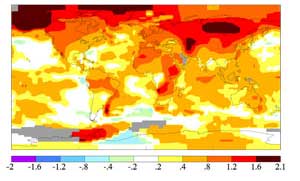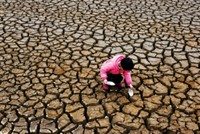Advertisement
Grab your lab coat. Let's get started
Welcome!
Welcome!
Create an account below to get 6 C&EN articles per month, receive newsletters and more - all free.
It seems this is your first time logging in online. Please enter the following information to continue.
As an ACS member you automatically get access to this site. All we need is few more details to create your reading experience.
Not you? Sign in with a different account.
Not you? Sign in with a different account.
ERROR 1
ERROR 1
ERROR 2
ERROR 2
ERROR 2
ERROR 2
ERROR 2
Password and Confirm password must match.
If you have an ACS member number, please enter it here so we can link this account to your membership. (optional)
ERROR 2
ACS values your privacy. By submitting your information, you are gaining access to C&EN and subscribing to our weekly newsletter. We use the information you provide to make your reading experience better, and we will never sell your data to third party members.
Environment
UN Issues Dire Climate Warnings
Human activities are responsible for temperature rise, panel's report says
by Bette Hileman
February 6, 2007

Using very strong language, a United Nations panel says global warming is unequivocal, and human activities are the major factor responsible for the temperature rise.
The report, released in Paris on Feb. 2, concludes that there is a greater than 90% certainty that Earth's temperature rise since 1950 has been caused by human greenhouse gas emissions and land-use changes. Using best estimates, it says, global average temperatures will rise 1.8 to 4.0 °C by 2100 relative to 2000. In contrast, the change from the 19th to the 20th century was 0.76 °C. Even if atmospheric levels of greenhouse gases are held constant at current levels, Earth will warm about 0.1 °C over each of the next few decades, the report says.
The new and fourth assessment, by the UN Intergovernmental Panel on Climate Change (IPCC), relies on a larger number of climate models of increasing complexity and realism than the previous assessment. Consequently, its projections are probably more accurate than those in the earlier report, which was published in 2001.
"The work is several steps beyond what was possible with the third report," says IPCC Chairman Rajendra K. Pachauri. "We are doing things to the climate that perhaps have not happened for 650,000 years."
"Making four to eight runs with each model allows us to be much more quantitative," says report coauthor Susan Solomon, an atmospheric scientist at the National Oceanic & Atmospheric Administration.
According to the report, sea level will rise between 0.18 and 0.57 meters from thermal expansion alone by 2100. This increase does not include the effects of uncertainties in the carbon cycle feedbacks and the full effects of rapid dynamical changes in ice flow from ice sheets because these effects cannot yet be modeled.
Many changes in climate have already been observed, the report says. Since 1978, summer Arctic sea ice has shrunk 7.4% per decade. The area of permafrost has declined. Increased precipitation has occurred over the eastern parts of North and South America, Northern Europe, and Northern and Central Asia. Drying has been observed in the Sahel, Southern Africa, the Mediterranean, and parts of Southern Asia. More intense and longer droughts have occurred over wider areas since the 1970s. Hurricane activity has intensified over the North Atlantic Ocean along with a rise in sea-surface temperatures.
These effects are expected to intensify as Earth warms further, the report says. By the end of the 21st century, "we would see what we have seen already, but everything would be more severe," says coauthor Gerald A. Meehl, a senior scientist at the National Center for Atmospheric Research.
Pachauri has called for a global summit on solutions to the climate-change problem. But U.S. Department of Energy Secretary Samuel W. Bodman says the IPCC report would not persuade the Administration to reverse its position opposing mandatory caps on greenhouse gas emissions.
The release on Feb. 2 was the first of three major sections of the full IPCC report. The other two sections will be published later this year.




Join the conversation
Contact the reporter
Submit a Letter to the Editor for publication
Engage with us on Twitter